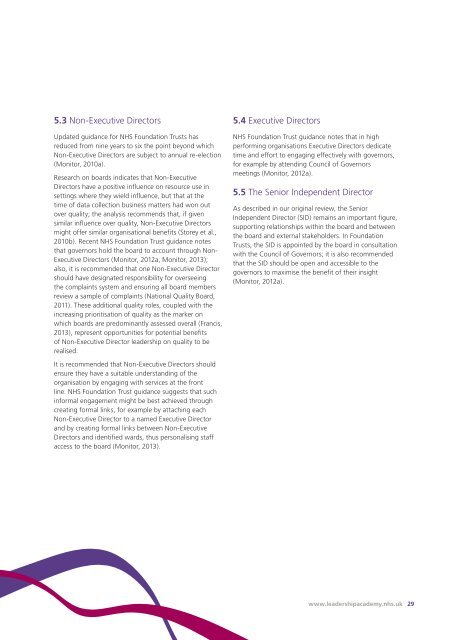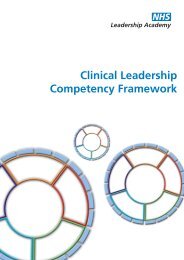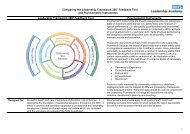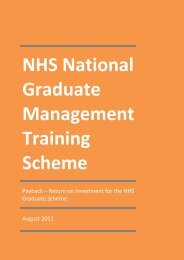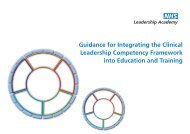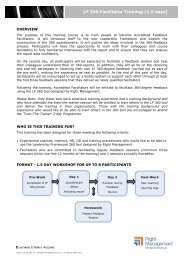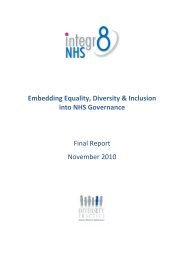Healthy NHS Board: a review of - NHS Leadership Academy
Healthy NHS Board: a review of - NHS Leadership Academy
Healthy NHS Board: a review of - NHS Leadership Academy
Create successful ePaper yourself
Turn your PDF publications into a flip-book with our unique Google optimized e-Paper software.
5.3 Non-Executive Directors<br />
Updated guidance for <strong>NHS</strong> Foundation Trusts has<br />
reduced from nine years to six the point beyond which<br />
Non-Executive Directors are subject to annual re-election<br />
(Monitor, 2010a).<br />
Research on boards indicates that Non-Executive<br />
Directors have a positive influence on resource use in<br />
settings where they wield influence, but that at the<br />
time <strong>of</strong> data collection business matters had won out<br />
over quality; the analysis recommends that, if given<br />
similar influence over quality, Non-Executive Directors<br />
might <strong>of</strong>fer similar organisational benefits (Storey et al.,<br />
2010b). Recent <strong>NHS</strong> Foundation Trust guidance notes<br />
that governors hold the board to account through Non-<br />
Executive Directors (Monitor, 2012a, Monitor, 2013);<br />
also, it is recommended that one Non-Executive Director<br />
should have designated responsibility for overseeing<br />
the complaints system and ensuring all board members<br />
<strong>review</strong> a sample <strong>of</strong> complaints (National Quality <strong>Board</strong>,<br />
2011). These additional quality roles, coupled with the<br />
increasing prioritisation <strong>of</strong> quality as the marker on<br />
which boards are predominantly assessed overall (Francis,<br />
2013), represent opportunities for potential benefits<br />
<strong>of</strong> Non-Executive Director leadership on quality to be<br />
realised.<br />
5.4 Executive Directors<br />
<strong>NHS</strong> Foundation Trust guidance notes that in high<br />
performing organisations Executive Directors dedicate<br />
time and effort to engaging effectively with governors,<br />
for example by attending Council <strong>of</strong> Governors<br />
meetings (Monitor, 2012a).<br />
5.5 The Senior Independent Director<br />
As described in our original <strong>review</strong>, the Senior<br />
Independent Director (SID) remains an important figure,<br />
supporting relationships within the board and between<br />
the board and external stakeholders. In Foundation<br />
Trusts, the SID is appointed by the board in consultation<br />
with the Council <strong>of</strong> Governors; it is also recommended<br />
that the SID should be open and accessible to the<br />
governors to maximise the benefit <strong>of</strong> their insight<br />
(Monitor, 2012a).<br />
It is recommended that Non-Executive Directors should<br />
ensure they have a suitable understanding <strong>of</strong> the<br />
organisation by engaging with services at the front<br />
line. <strong>NHS</strong> Foundation Trust guidance suggests that such<br />
informal engagement might be best achieved through<br />
creating formal links, for example by attaching each<br />
Non-Executive Director to a named Executive Director<br />
and by creating formal links between Non-Executive<br />
Directors and identified wards, thus personalising staff<br />
access to the board (Monitor, 2013).<br />
www.leadershipacademy.nhs.uk 29


